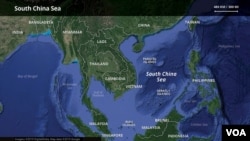U.S. Secretary of Defense Lloyd Austin and Chinese Defense Minister Dong Jun held their first in-person meeting on the sideline of the Shangri-La Dialogue in Singapore on Friday.
The two officials exchanged views on a range of contentious issues, including the rising tension across the Taiwan Strait, the ongoing confrontation between the Philippines and China in the South China Sea, as well as major global conflicts like Russia’s war in Ukraine and the Middle East conflict.
During the 75-minute meeting, Austin and Dong both highlighted the importance of maintaining open lines of communication between the two militaries and vowed to resume the hotline between theater commanders from both sides in the coming months.
Austin reiterated Washington’s concern about China’s recent two-day military exercise encircling Taiwan and urged Beijing not to use Taiwan’s political transition, which he characterized as part of a routine democratic process, as "a pretext for coercive measures" against the democratic island.
At a news conference Friday following the meeting between the two defense officials, Chinese Defense Ministry spokesperson Wu Qian told journalists from more than a dozen Chinese and foreign media outlets, including VOA, that the Taiwan question remains purely China’s internal affairs and that external forces "have no right to interfere in the issue."
Washington’s behavior "severely violated the commitments made by the U.S. side" and sent wrong signals to "the Taiwan independence separatist forces," Wu said during the 50-minute news conference.
In addition to the rising tension across the Taiwan Strait, Austin and Dong also exchanged views on the ongoing confrontation between the Philippines and China in the South China Sea.
Austin said the United States will continue to "fly, sail, and operate" wherever international law allows safely and responsibly while stressing the importance of respecting high seas freedom of navigation under international law, especially in the South China Sea.
During the meeting, Dong said the Philippines has broken its promises due to support from "outside forces" and keeps making provocations on the disputed Second Thomas Shoal in the South China Sea, which both Beijing and Manila view as its territories, according to Chinese Defense Ministry spokesperson Wu.
The Chinese defense minister also criticized Washington for deploying mid-range missile systems to the Philippines "under cover of a military exercise," warning that such a move poses a real threat to regional security.
"We remain committed to resolving the disagreements with the Philippines side through consultation on an equal footing, but our tolerance for continued and intensified provocations will have a limit," Wu told journalists during the press conference.
Apart from the two contentious issues in the Indo-Pacific region, Austin and Dong also exchanged views on the ongoing wars in Ukraine and the Middle East. The U.S. defense secretary expressed Washington’s concerns about North Korea’s "direct contributions to Russia's ongoing assault on Ukraine."
Dong reiterated that China has maintained a "just and impartial position" on the Ukraine conflict, honored the promise of not providing weapons to either side in the war and strictly controlled the "export of military items and dual-use goods in accordance with relevant laws and regulations."
He urged the United States not to shift the blame for the ongoing war onto China and said that Beijing will continue to play a constructive role in promoting peace talks, according to Wu.
The Chinese Defense Ministry said the two sides will have ongoing consultations regarding future exchanges between the two militaries, with engagements between military academies and potential bilateral policy dialogues being the potential starting point.
"We believe that having meetings is better than no meeting and having dialogues is better than having no dialogue at all," Wu told journalists, adding that bilateral exchanges like this meeting can help develop "the sound and stable" military-to-military relationship.
Some analysts say the meeting between Austin and Dong is mainly focusing on "posturing" and sharing the fundamental and core interests and red lines from Beijing and Washington’s perspectives.
"The talk is not about negotiation or high-level diplomacy but more about establishing lines of communication for the hard work that usually goes on at the lower level," Stephen Nagy, a regional security expert at the International Christian University in Japan, told VOA.
While military-to-military communication between Beijing and Washington is important and has the effect of de-escalating growing regional tensions, one thing that remains to be seen is whether the Chinese side will "pick up the phone" in the event of an actual crisis.
"Due to the nature of China’s political system, power has been highly centralized under Xi Jinping, [so] we are not sure if our Chinese counterpart would be able to pick up the phone, communicate and make decisions in a crisis situation," he added.
Despite this uncertainty, some experts say conversations between defense leaders remain "incredibly helpful." The two officials “can have a conversation about intentions that’s incredibly stabilizing to the overall relationship, [but] I don’t think there is a lot of room for adjusting each side’s red lines," Rorry Daniels, managing director of the Asia Society Policy Institute, told VOA by phone.
But with tensions rising in several parts of Asia, including the Taiwan Strait, South China Sea, and the Korean Peninsula, some observers, say Friday’s dialogue between Austin and Dong will be increasingly crucial for the region, especially at a time when there are two ongoing military conflicts in the world.
"It is a way both sides can turn down the temperature, exchange information in a multilateral security forum, and have corridor diplomacy, which is extremely important for high-context Asian culture that shies away from talking about volatile issues openly and frankly in the public," Lim Tai Wei, Professor at the National University of Singapore, told VOA in a video interview.
VOA Seoul Correspondent William Gallo contributed to this report.
